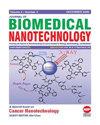肿瘤衍生外泌体通过激活 miR-423-5p/EFNA3 信号通路促进血管内皮细胞的血管生成功能
IF 2.9
4区 医学
Q1 Medicine
引用次数: 0
摘要
血管生成在促进乳腺肿瘤的生长和转移方面起着关键作用。肿瘤外泌体(EXs)通过转移其携带的RNA促进各种肿瘤组织的血管生成。MiR-423-5p 在多种肿瘤中富集,并与肿瘤生长有关。在这项研究中,我们研究了肿瘤衍生的EXs及其携带的miR-423-5p在调节人脐静脉内皮细胞(HUVEC)功能中的作用和潜在机制。我们收集了来自MCF-7细胞的EXs(MCF-7 EXs)或敲除了miR-423-5p的EXs(MCF-7 EXsSimiR-423-5p),并将其与ECs培养,然后检测ECs的增殖、迁移和管形成能力。我们发现,miR-423-5p 在乳腺癌 MCF-7 细胞系及其衍生的 EXs 中富集。在与 HUVECs 共培养后,MCF-7 EXs 合并到 HUVECs 中,随后增加了 miR-423-5p 的表达,提高了 HUVECs 的增殖、迁移和管形成能力,同时增加了 EFNA3 和 Notch1 的表达,而 miR-423-5p 的敲除可部分消除这种增殖、迁移和管形成能力。总之,我们的数据表明,富含miR-423-5p的MCF-7 EX可通过激活miR-423-5p/EFNA3/Akt信号通路促进血管内皮细胞的血管生成功能。本文章由计算机程序翻译,如有差异,请以英文原文为准。
Tumor-Derived Exosomes Promote the Angiogenic Function of Vascular Endothelial Cells by Activating the miR-423-5p/EFNA3 Signaling Pathway
Angiogenesis plays a key role in promoting the growth and metastasis of breast tumors. Tumor exosomes (EXs) contribute to angiogenesis in various tumor tissues by transferring their carried RNAs. MiR-423-5p was enriched in multiple tumors and implicated in tumor growth. In this study,
we investigated the roles and underlying mechanisms of tumor-derived EXs and their carried miR-423-5p in regulating human umbilical vein endothelial cell (HUVEC) functions. EXs derived from MCF-7 cells (MCF-7 EXs) or with miR-423-5p knockdown (MCF-7 EXsSimiR-423-5p) were collected
and incubated with ECs, and then the proliferation, migration, and tube formation abilities of ECs were detected. We found that miR-423-5p was enriched in breast cancer, MCF-7 cell lines and their derived EXs. After coculture with HUVECs, MCF-7 EXs merged into HUVECs and subsequently increased
the miR-423-5p expression, proliferation, migration, and tube formation abilities of HUVECs, paralleling the increased EFNA3 and Notch1 expression, which was partially abolished by miR-423-5p knockdown. Altogether, our data suggest that MCF-7 EXs enriched with miR-423-5p promote the angiogenic
function of vascular endothelial cells by activating the miR-423-5p/EFNA3/Akt signaling pathway.
求助全文
通过发布文献求助,成功后即可免费获取论文全文。
去求助
来源期刊
CiteScore
4.30
自引率
17.20%
发文量
145
审稿时长
2.3 months
期刊介绍:
Information not localized

 求助内容:
求助内容: 应助结果提醒方式:
应助结果提醒方式:


